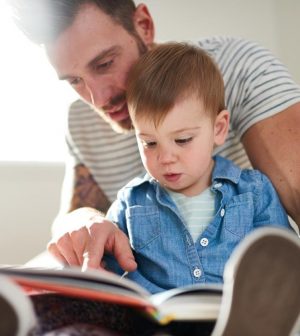- Could Your Grocery Store Meat Be Causing Recurring UTIs?
- Are You Making This Expensive Thermostat Error This Winter?
- Recognizing the Signs of Hypothyroidism
- 10 Strategies to Overcome Insomnia
- Could Artificial Sweeteners Be Aging the Brain Faster?
- Techniques for Soothing Your Nervous System
- Does the Water in Your House Smell Funny? Here’s Why
- Can a Daily Dose of Apple Cider Vinegar Actually Aid Weight Loss?
- 6 Health Beverages That Can Actually Spike Your Blood Sugar
- Treatment Options for Social Anxiety Disorder
Reading to Your 1- and 2-Year Old Boosts Their Vocabulary, Study Finds

Sharing a book with your baby will build her vocabulary fast, but time with screens likely won’t, Norwegian researchers report.
Their new study on shared reading and vocabulary size dovetails with a new policy statement from the American Academy of Pediatrics that urges parents to read books to their little ones.
A team at the University of Oslo asked parents of 1,442 Norwegian 1- and 2-year-olds how many words their toddlers said or understood. Parents also reported how often they read to their children and how much screen time the youngsters had each day.
The upshot: 1- and 2-year-olds who were frequently read to had bigger vocabularies than their peers, while vocabulary size shrank with a rising level of screen time among 2-year-olds. Researchers saw no link between screen time and 1-year-olds’ vocabulary.
The findings were recently published in the Journal of Child Language.
“These results demonstrate an association between activities and language development already in the early years of a child’s life and support general recommendations to read more and perhaps reduce screen time for young children,” said first author Audun Rosslund, a doctoral research fellow at the University of Oslo in Norway.
The study doesn’t prove books beat screen time when it comes to vocabulary building. It only shows an association between language development and shared reading or screen time.
But researchers suspect that two aspects of shared reading contribute to children’s language development. One is exposure to the diversity of words contained in children’s books, and the other is the interaction between parent and child.
They note that too much screen time may limit chances for more interactive activities that foster language development.
Rosslund’s team also found that the link between shared reading and vocabulary development in 1-year-olds was even stronger in families where Mom had less formal education. They said this holds promise for interventions to reduce inequalities in early learning.
“Moving forward, we hope researchers will also investigate the possible impact of the quality of screen time on language development,” Rosslund said in a university news release.
More information
This Reading Mama has tips to help parents recognize signs that a child is ready to read.
SOURCE: University of Oslo, news release, Oct. 1, 2024
Source: HealthDay
Copyright © 2026 HealthDay. All rights reserved.










